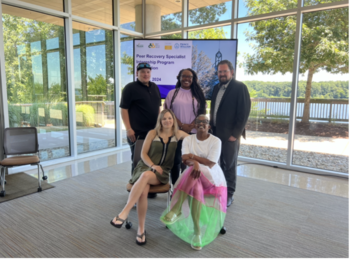In This Story

On July 11, 2024, the School of Nursing Empowered Communities Peer Recovery Specialist (PRS) Internship Program celebrated the graduation of its first cohort. This initiative, developed in collaboration with Prince William County Community Services, aims to strengthen community support and collaboration in Northern Virginia by training the next generation of skilled PRS to aid individuals facing substance use and mental health challenges.
Four interns completed the program, with several already securing positions in the field. Their success is a testament to the program’s effectiveness in preparing skilled and passionate peer recovery specialists.
“I have already used so much of what I learned in the program,” says Jennifer Prestidge, one of the newly graduated PRS interns. “I really appreciate everything that the program did for me and my classmates. I love that I have a new way of thinking and looking at my life. This program was a huge part of that process.”
The PRS Internship Program was launched in response to the growing need for skilled peer recovery specialists in Northern Virginia. With substance use and mental health issues on the rise, there is an urgent demand for professionals who can provide empathetic and effective support. The program’s vision is to fill this gap by equipping interns with the necessary skills and experiences to make a meaningful impact in their communities.
Prestidge says that the program does just that. “I have confidence in myself I didn't have before. Now, when I walk into a room, I know I can handle it thanks to the guidance and training this program provided.
A cornerstone of the PRS Internship Program is its focus on experiential learning. Interns gain hands-on experience in various settings, including Medication-Assisted Treatment (MAT) clinics, community-based peer groups, and dual diagnosis clinics. This diverse exposure ensures that interns are well-prepared to handle a range of recovery scenarios and support needs.
“While participating in our programing, PRS Interns have been able to learn how to effectively work within different systems and promote person-centered services and recovery-based support systems,” says Cicely Spencer, the PRS internship coordinator.
In addition to practical experience, the program offers extensive didactic training. Interns receive education on addiction recovery principles, effective communication skills, ethical practices, and cultural competencies. For example, they learn how to navigate complex ethical dilemmas in peer support and develop cultural sensitivity to better serve diverse populations.
Each intern is paired with an experienced mentor who provides guidance and support throughout the program. This mentorship component is crucial, as it allows interns to learn from seasoned professionals, navigate the intricacies of peer support, and receive feedback in a supportive learning environment.
“I know the program was intended to teach us, but it gave me more than knowledge. It also gave me a family. I am still in touch with some of my classmates and am thankful for everything it has done for me,” says Prestidge.
The graduates of the PRS Internship Program are now actively contributing to the community, providing much-needed support and enhancing the quality of recovery services. Their work is making a significant difference in the lives of individuals facing substance use and mental health challenges.
"I am immensely proud of our first cohort of graduates,” says Rebecca Sutter, director of the Mason and Partners (MAPS) clinic in the School of Nursing. “Their dedication and commitment to improving the lives of those struggling with substance use and mental health challenges is truly inspiring. We look forward to continuing this important work and making a positive impact in our community."
George Mason is committed to continuing the success of the PRS Internship Program. Moving forward, the program goals include building strong partnerships, increasing the number of skilled PRS interns, and expanding its reach to support more communities. The result will be the creation of a network of peer recovery specialists who can effectively address the growing substance use and mental health challenges in Northern Virginia.
